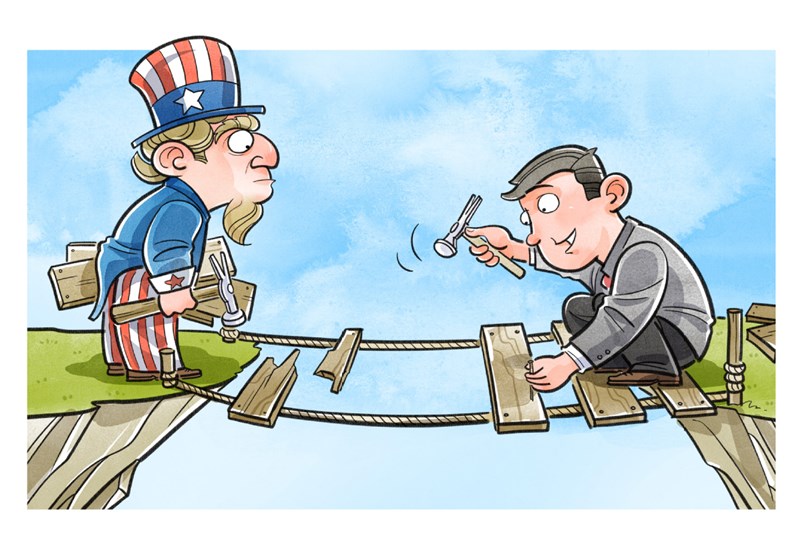Is Biden's China team fit for the job?
Song Chen/ China Daily

US President Joe Biden's China team is competent but does not inspire confidence. Given the COVID-19 pandemic, the global economic downturn and the harsh chorus of wolfish howls and growls on both sides of the US-China divide, it will take more than the usual bureaucratic competence to get things back to a decent footing.
The diplomatic facilitators of the US' China policy, knocked into a tizzy of not knowing which way to turn under the ever-shifting, erratic tides of former US president Donald Trump, can now take a deep breath, roll up their sleeves and get back to their work of building trust, resolving disputes, implementing policy and maintaining peace.
Trump left much carnage in his wake, both at home and abroad. He wasn't consistently anti-China-he praised President Xi Jinping's handling of the novel coronavirus crisis-and his predictable narcissism and greed could indeed at times benefit Beijing. But his anti-China rant, racist innuendo and abusive language will not be forgotten anytime soon.
The good news for US-China relations is that the accession of Biden brings with it the promise of decent speech, a degree of fair play and the restoration of protocol. The bad news is that the points of dispute are many, and things could actually get worse.
After half a century of government service, Biden is a seasoned bureaucrat. He doesn't rule by ego or take credit for everything. He is a team player. In putting together his China team, he has called upon partisan professionals who he has reason to trust. Most of his picks are experienced Beltway practitioners who adhere to Democratic Party-line diplomacy.
Judging from the names he has put forward so far-Anthony Blinken (secretary of state), Kurt Campbell (senior official for Asia policy), Ely Ratner (top Pentagon advisor), Avril Haines (National Intelligence director), William Burns (CIA director), Lloyd Austin (secretary of defense), Janet Yellen (secretary of treasury)-the US' China policy going forward will be more muscular than that of the feckless and oft-indifferent Barack Obama administration.
It will probably be somewhat closer to what the relatively strident Hillary Clinton would have sought had she won the ticket in 2016. However, the absence of Clinton stalwart Michelle Flournoy (former defense policy advisor), and the "demotion" of former Obama "Valkyries" Samantha Powers (former US ambassador to the UN) and Susan Rice (former national security advisor) to less-essential roles hints of a policy shift away from goggle-eyed humanitarian intervention and more inclined to hard realism.
Biden is yet to choose an ambassador to Beijing, a judicious pick for which could restore a degree of trust to both sides.
Blinken, the new secretary of state, has said Trump's decision to get tough with China was the right one. More surprisingly, when asked about the incendiary declaration made by his unpopular predecessor Mike Pompeo, who accused China of "genocide" in the Xinjiang Uygur autonomous region, he said, "that would be my judgment as well".
If this is an accurate indication of which way the wind is now blowing in Foggy Bottom, then US-China relations are going to remain on tenterhooks for some time to come. Bilateral relations may be less subject to whim and whimsy than before, but the potential for existential disputes and over-reaction on both sides remains high.
Biden's China-related appointees include many Beltway insiders, consummate players in the game which bankers, corporate lobbyists, Silicon Valley czars, and Pentagon factotums mix promiscuously.
Think tanks and consultants play an outsized, if somewhat under-appreciated role. As the joke goes, the job of think tanks is to make the taxpayer think they need more tanks. Consultants reap lucrative fees sealing the deal. Biden's appointments are no exception. They represent an attempt to return to business as usual, though business is bad and things are unusual.
Blinken, for example, co-founded the Center of a New American Security think tank with Flournoy, and later formed the West Exec Advisors.
Well-heeled WestExec consultants include former CIA deputy director Haines, and long-time Biden aide, Ely Ratner, who will be advisor to Defense Secretary Austin.
Flournoy, who has served with Blinken at both organizations, is conspicuous by her absence from the first round of plum appointments. Known for her hawkish views on China, with an eye to militarizing the South China Sea, she was at one time tipped to be secretary of defense in the event of Clinton becoming president. The appointment of the Austin-Ratner team in the Pentagon might be understood as a rejection of Flournoy's hard-line views for a more realist approach.
The return to "normalcy" must go beyond the reinstitution of protocol and tact and extend to both sides keeping their part of the deal in regard to the one-China policy. Pompeo's eleventh-hour support for a "unilaterally independent" Taiwan in violation of the three joint communiques was custom-made to create a diplomatic minefield for the incoming US administration.
The perception gap remains wide, and reaching across the divide will not be easy. But only through cooperation can global issues such as the pandemic and climate change be properly addressed.
Writing by Phil Cunningham (The author is a media researcher covering Asian issues); editing by Wang Jingzhong